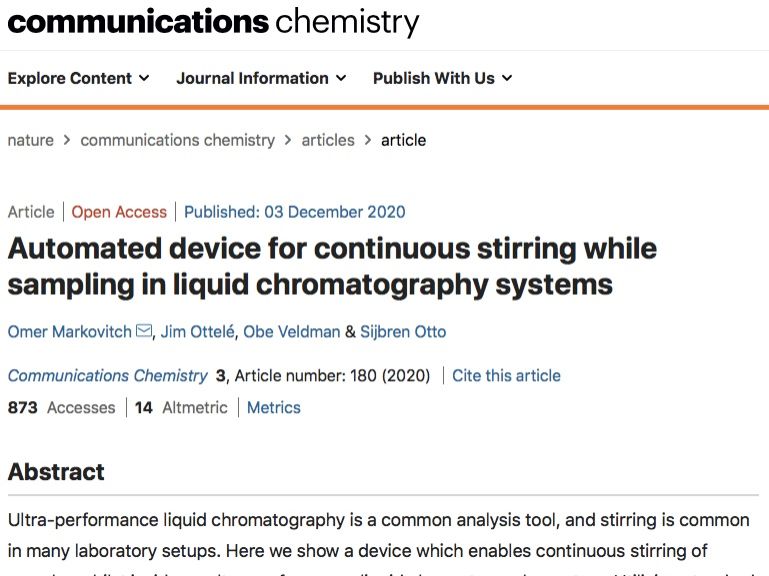Open Access Publication in the Spotlight (February) - 'Automated Device for Continuous Stirring while Sampling in Liquid Chromatography'

Each month, the open access team of the University of Groningen Library (UB) puts a recent open access article by UG authors in the spotlight. This publication is highlighted via social media and the library’s newsletter and website.
The article in the spotlight for the month of February 2021 is titled Automated device for continuous stirring while sampling in liquid chromatography systems, written by Omer Markovitch, Jim Ottelé, Sijbren Otto (all from the Center for Systems Chemistry, Stratingh Institute, Faculty of Science and Engineering) and Obe Veldman (Veldman Technische Ontwikkeling en Advisering).
Abstract
Ultra-performance liquid chromatography is a common analysis tool, and stirring is common in many laboratory setups. Here we show a device which enables continuous stirring of samples whilst inside an ultra-performance liquid chromatography system. Utilizing standard magnetic stirring bars that fit standard vials, the device allows for the automation of experimental setups that require stirring. The device is designed such that it can replace the standard sample holder and fits in its place, while being battery operated. The use of three-dimensional (3D) printing and commercially available parts enables low-effort and low-cost device production, as well as easy modifications. Testing the device was performed by video analysis and by following the kinetics of a dynamic combinatorial library that is known to be exquisitely sensitive to agitation, as a result of involving a fiber growth-breakage mechanism. Design files and schematics are provided.
For some more background information, see also this ‘Behind the paper’ blog post that Omer Markovitch wrote on Nature's Research Chemistry Community blog.
We asked the corresponding author, Omer Markovitch, a few questions about the article:
This article was published open access, was open access a deliberate choice?
Publishing open access was not a deliberate choice in the early stages. We (Me, Jim Ottelé, and our other coauthors) were more driven by the science we wanted to achieve using such a device (the high throughput collection of high quality data that would enable further understanding of the dynamics of our chemical system). Only after we've had an early prototype we began realising that, because there was no similar solution available - commercially or otherwise, other laboratories around the world could potentially benefit from such a device and therefore there would be merit in publishing our work openly.
During the final stages of publication we made a conscious decision to go for open access and included all our raw data and design files in our publication. We wanted to "lower the barrier" for others to access and reconstruct the device.
In the 'Acknowledgements' section in the article, the different funders (NWA Startimpuls, ERC, NWO) that have financed this work are mentioned. Did requirements of the funders play a role in your choice to publish open access?
The answer to this question is "partially". This is because open access requirements could be met simply by depositing a version of the manuscript in a repository.
To publish your article open access, the publisher charged an article processing charge (APC) of 2680 euro. How did you pay for this, and what do you think of such a fee?
I am a fellow of the Dutch Origins Center, and the fee was covered from my research budget - though, I am 100% confident that if needed our research group (led by Prof. Sijbren Otto) would have found a way to cover it.
In this particular journal there is no direct publication fee [submission fee or page charges] but an open-access one is required, so I am viewing it [the APC] as an indirect publication cost with an "added bonus".
You have also made the raw data files and the design files openly available, for anyone to use. Why did you decide to do this? How common is it to open up raw data in your field/discipline?
I can say for myself that if things are directly available to me in "my own" language I am much more likely to understand and use them. Therefore, we have deposited all the design files and data in Zenodo - this is a free & open repository that sprung from CERN. The reason for that is that some people might consider the fact that the main document is in a scientific journal as a barrier if they are unaware that it is actually an open access one.
I do not think that it is too common in the chemistry field to make available all the raw data behind a publication publically available.
Why is that not common in your field?
I do not have an idea why this is like that. This particular work and publication is quite different than what we would usually do.
Could you reflect on your experiences with open access and open science in general?
I am happy that it turned out like that, open access and making the device open hardware. The idea of open access research is that anyone can access it from anywhere at any time and without costs. This increases the chance that people from diverse fields and backgrounds will make use of it. During the development of the device we have made use of openly available parts (like the Arduino microcontroller) so it makes sense to give back by making our own work openly available.
Useful links:
Omer Markovitch’ personal website
Omer Markovitch on YouTube talking about his research
Funder policies regarding open access
Citation:
Markovitch, O., Ottelé, J., Veldman, O., & Otto, S. (2020). Automated device for continuous stirring while sampling in liquid chromatography systems. Communications Chemistry, 3(1). doi:10.1038/s42004-020-00427-5
If you would like us to highlight your open access publication here, please get in touch with us.


